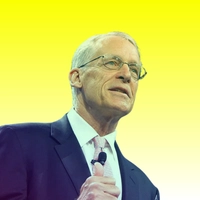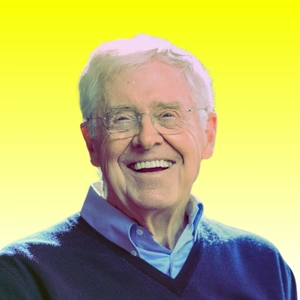
Charles Koch
Co-Owner of Koch Industries
Current Networth - $67.5 Billion
Personal Stats
| Name | Charles Koch |
|---|---|
| Role | Businessman |
| Industry | Petroleum & Chemicals |
| Net Worth | $67.5 Billion |
Related People
Table of Contents
- About Charles Koch
- Businesses Owned
- Early Life
- Family
- What Is Charles Koch’s Net Worth?
- What Is Charles Koch’s Claim To Fame?
About Charles Koch
Born on November 1, 1935, in Wichita, Kansas, Charles inherited and expanded the family business, which his father, Fred C. Koch, founded. Under his leadership, Koch Industries has diversified its operations, encompassing sectors such as refining, chemicals, energy, fiber, minerals, fertilizers, pulp and paper, and ranching. Charles Koch is also known for his significant contributions to libertarian and conservative political causes, supporting various think tanks, academic institutions, and advocacy groups through the Charles Koch Foundation.
His business acumen, combined with his commitment to promoting free-market principles, has made him a highly influential figure in both the corporate and political arenas.
Businesses Owned

Koch Industries

Flint Hills Resources

Georgia-Pacific

Koch Ag & Energy Solutions

Koch Chemical Technology Group

INVISTA

Koch Pipeline Company

Koch Supply & Trading

Guardian Industries

Molex

Infor
Early Life
Charles Koch's early life set the foundation for his future leadership of Koch Industries, where he expanded and diversified the business into a global conglomerate.
- Born on November 1, 1935, in Wichita, Kansas, USA.
- Attended local schools in Wichita.
- Graduated from the Massachusetts Institute of Technology (MIT) with a Bachelor of Science in General Engineering in 1957.
- Earned two additional degrees from MIT: a Master of Science in Nuclear Engineering in 1958 and a Master of Science in Chemical Engineering in 1960.
- Initially worked for Arthur D. Little, Inc., a consulting firm, after completing his education.
- Joined his father's company, Rock Island Oil & Refining Company, in 1961.
- Took over the company in 1967 after his father’s passing, renaming it Koch Industries.
- Early exposure to his father's business and free-market principles influenced his business philosophy and later political views.
Family
Charles Koch's family life is marked by his long-standing marriage, the involvement of his children in various ventures, and significant philanthropic activities.
- Charles’s father, Fred C. Koch, was the founder of Koch Industries. His mother is Mary Robinson Koch.
- His siblings include brother David Koch (deceased), former executive vice president of Koch Industries; Frederick R. Koch (deceased), art collector and philanthropist; and brother William "Bill" Koch, businessman and sailor.
- Married to Liz Koch (née Elizabeth Robinson) since 1972.
- His son, Charles Chase Koch, president of Koch Disruptive Technologies, is involved in the family business.
- His daughter, Elizabeth Koch, an author and publisher, was involved in various entrepreneurial ventures.
- Charles and his family reside in Wichita, Kansas, where Koch Industries is headquartered.
- The Koch family is known for their extensive philanthropic efforts, contributing to education, public policy, and arts organizations through the Charles Koch Foundation and other charitable endeavors.
Charles Koch is an American businessman and philanthropist, serving as the Chairman and CEO of Koch Industries, one of the largest privately held companies in the U.S. Known for his libertarian views, Koch has significantly influenced politics and economics through substantial contributions to educational and policy organizations. He is also an advocate for free-market principles and criminal justice reform.
| Net Worth | $67.5 Billion |
|---|---|
| Profession | Business person, Philanthropist, Industrialist |
| Nationality | American |
| No. of Houses | 4 |
| No. of Cars | 3 |
What Is Charles Koch’s Net Worth?
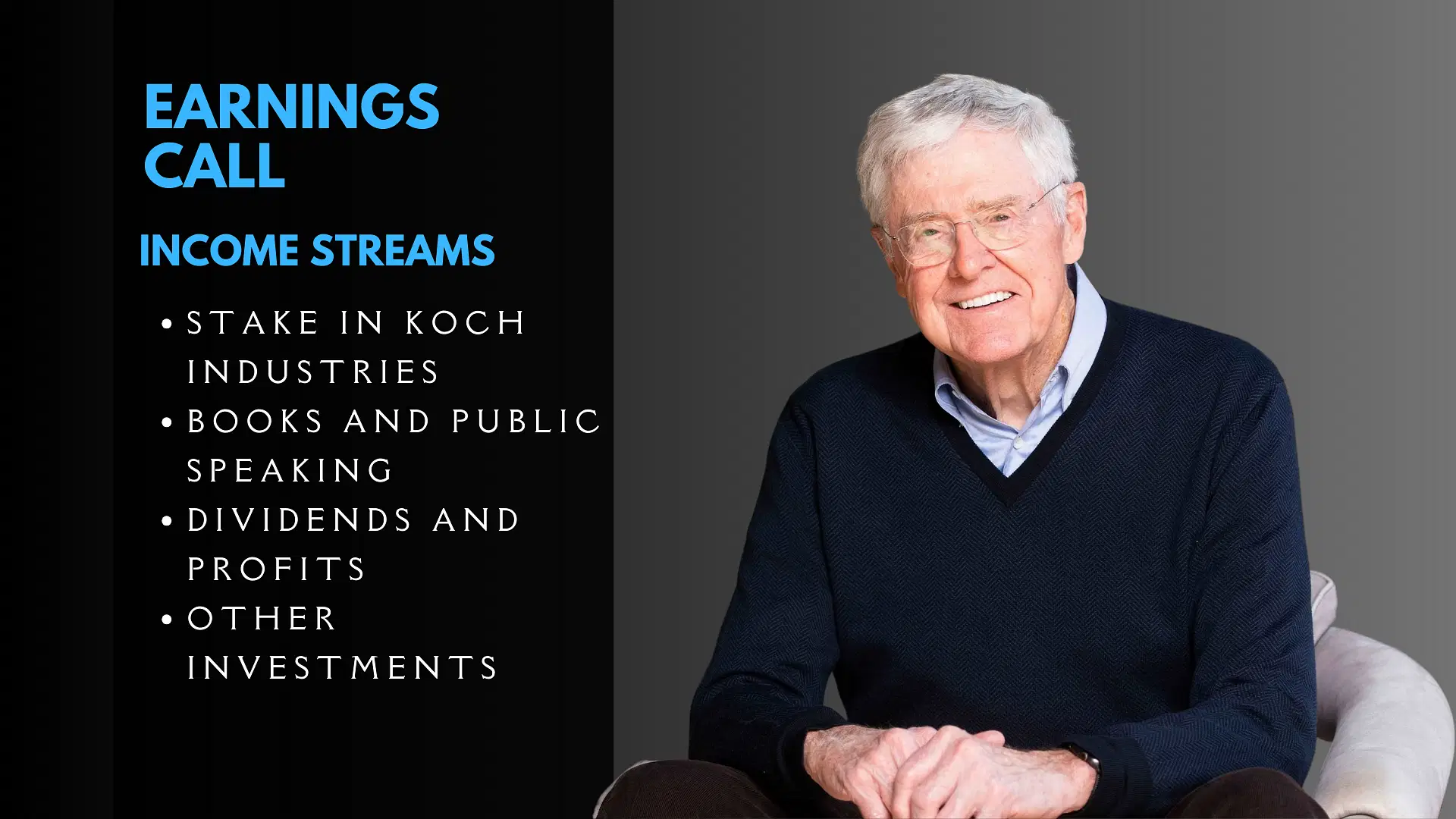
As of March 2025, Charles Koch has a net worth of $67.5 billion.
Charles Koch owns 42% of Koch Industries, which is the second-largest private company in America, with annual revenues exceeding $125 billion. Acquired in 2005 for $21 billion, Georgia-Pacific produces paper products, including brands like Quilted Northern Tissue and Brawny paper towels. Purchased for $4.2 billion in 2004, INVISTA produces fibers, fabrics, and polymers, including well-known brands like Lycra and Stainmaster. Charles Koch's estimated net worth is around $67.8 billion as of 2024, ranking him among the wealthiest individuals globally.
What Is Charles Koch’s Claim To Fame?
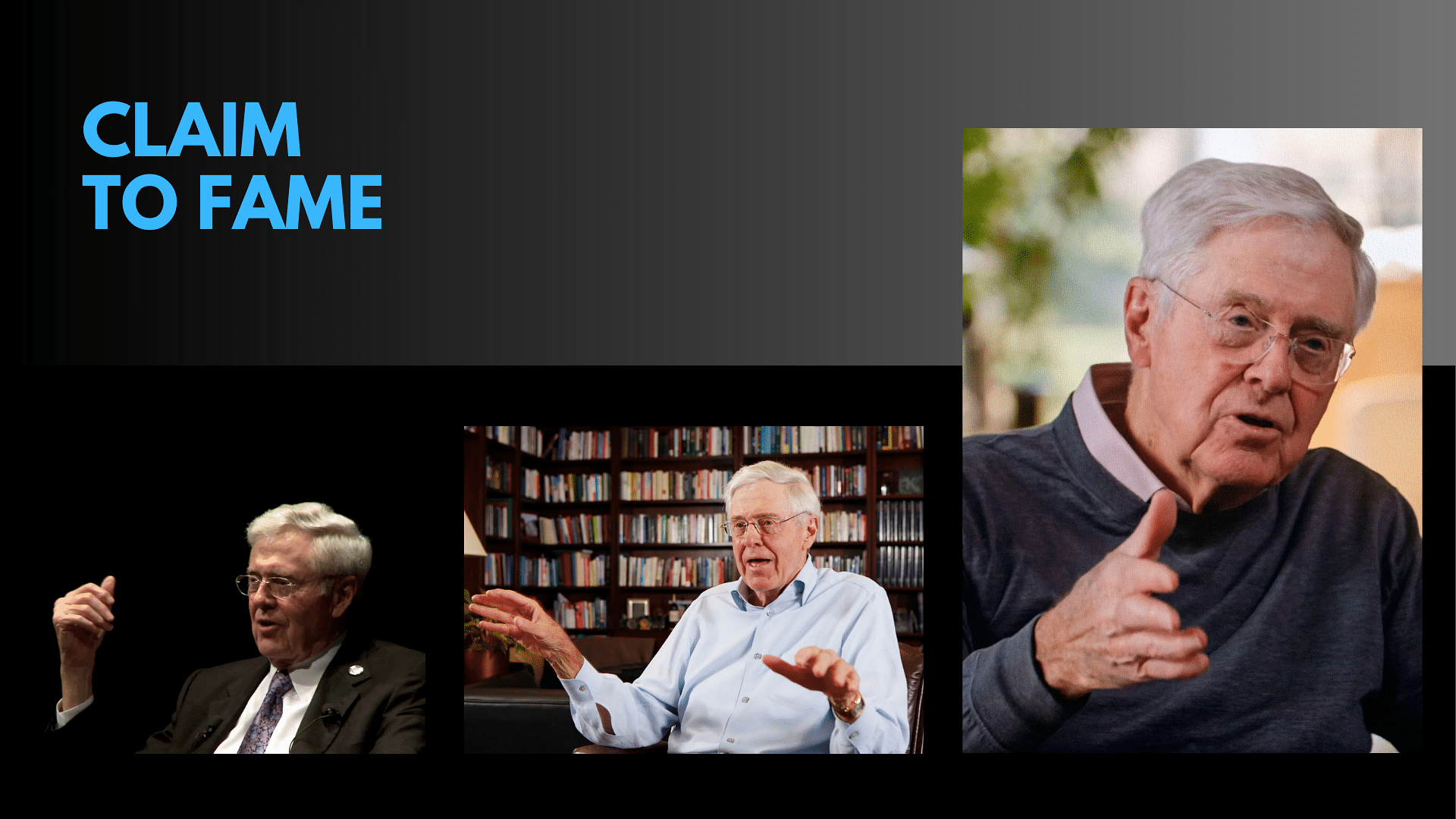
Charles Koch's claim to fame is his role as Chairman and CEO of Koch Industries, one of the largest privately held companies in the world. Under his leadership, the conglomerate expanded its reach into diverse sectors like energy, chemicals, and manufacturing. Koch was fully acquired in 2017. This company manufactures glass for automobiles and buildings, employing over 14,000 people globally.
What Businesses Does Charles Koch Own?
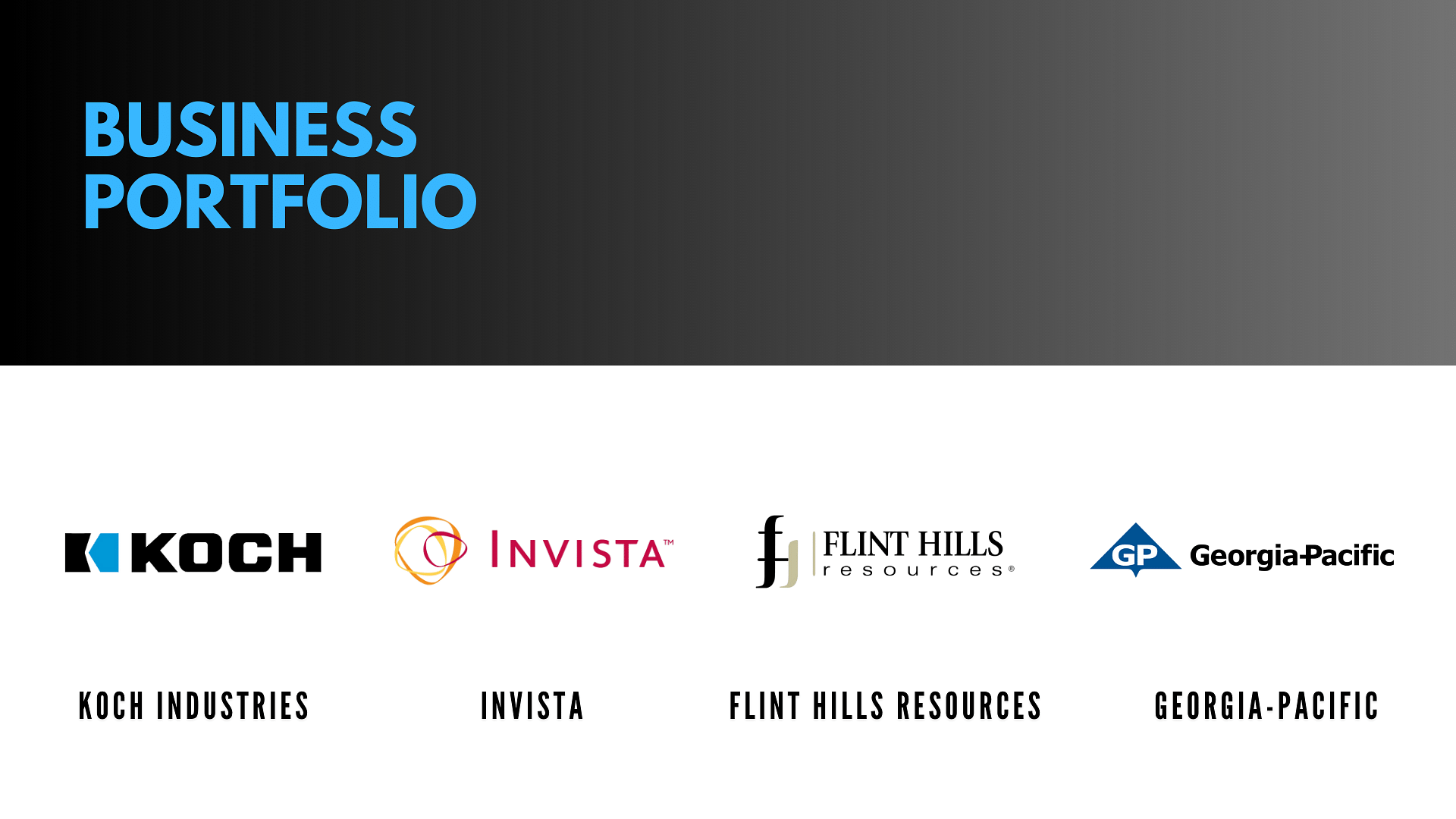
Charles Koch owns Koch Industries, a vast conglomerate with subsidiaries in multiple sectors.
- Koch Industries: Charles Koch owns 42% of Koch Industries, a conglomerate with interests in a wide range of sectors, including oil refining, chemicals, paper products, and more. Koch Industries is the second-largest private company in America, with annual revenues exceeding $125 billion.
- Georgia-Pacific: The paper and packaging company boasts its existence in over 60 countries and employs over 100,000 people. The total revenue of Georgia-Pacific in the last financial year was $17 billion.
- Flint Hills Resources: This is a much smaller subsidiary with around 2,000 employees only. The company deals with refining materials and chemicals, which enabled the company to generate a peak revenue of $2.5 billion in the 2023 FY.
- Koch Ag & Energy Solutions: The subsidiary is much more successful than Flint Hills, with an annual revenue of over $500 billion. The company is involved in everything from agriculture to the production of energy.
- Koch Supply & Trading: Another subsidiary of Koch Industries that focuses on commodity trading and had $136 billion in annual revenue in the last financial year.
- INVISTA: Koch Industries bought INVISTA in 2004 for $4.2 billion, and the company, with over 10,000 employees, generated $115 billion in revenue in 2023.
The billionaire also has significant interests in ranching, glass manufacturing (Guardian Industries), and investments in various technologies and businesses through Koch Disruptive Technologies. This diversified portfolio makes Koch Industries one of the largest privately held companies globally.
How Does Charles Koch Spend His Billions?
Charles Koch spends his billions through extensive philanthropic efforts, political contributions, and business investments. He supports educational institutions and think tanks that promote free-market principles, such as the Cato Institute and the Mercatus Center.
Charles Koch has invested $17 billion in think tanks that lobby against environmental regulation, such as the Cato Institute and the Mercatus Center. These institutions advocate for free-market policies and oppose regulations they view as restrictive to economic growth.
Koch is also involved in criminal justice reform and poverty alleviation through donations to various non-profits. Additionally, he invests in innovative technologies and startups via Koch Disruptive Technologies. His spending reflects his commitment to libertarian values and societal improvement.
How Many Houses Does Charles Koch Own?

Charles Koch has no specific information about owning houses, although from several sources, it is identified that he may own houses in Wichita, Kansas; Aspen, Colorado; Indian Wells, and California.
- Primary home: Charles Koch owns several properties, including a primary residence in Wichita, Kansas, where Koch Industries is headquartered.
- Other homes: He also has homes in Aspen, Colorado, and Indian Wells, California, among other locations. He paid $10 million for the property in Indian Wells in 1999 and then paid another $3.25 million for a property next door.
These properties were selected for their proximity to business operations, privacy, and leisure opportunities. Each home supports his work-life balance, reflecting a blend of business convenience and personal enjoyment.
How Big Is Charles Koch’s Car Collection?
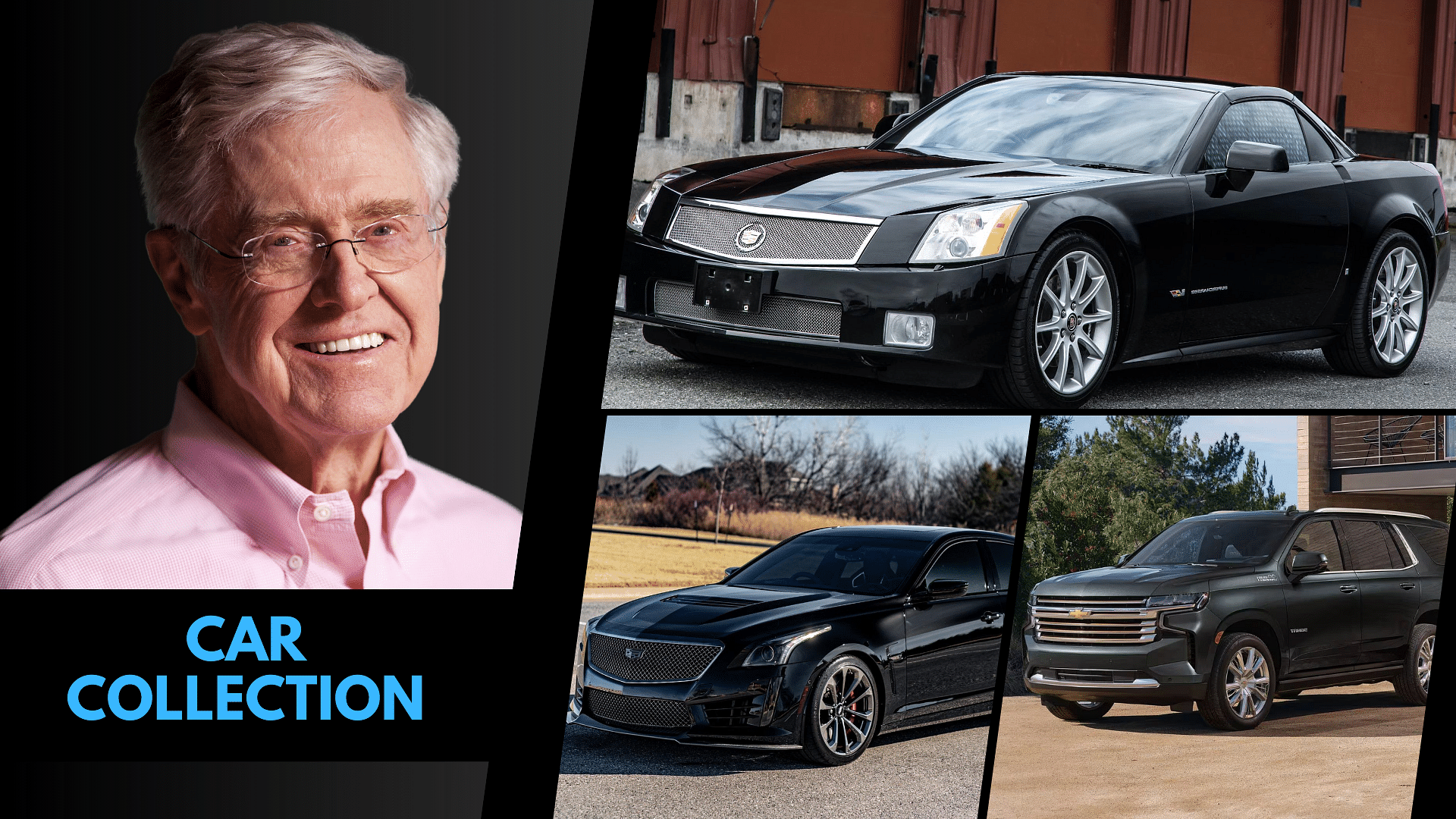
Charles Koch's car collection is not widely publicized, but he is known to have a preference for classic and luxury automobiles. However, some reports are saying that he may have cars like the Cadillac XLR-V, the Cadillac CTS-V, and the Chevrolet Tahoe. Specific details on the size and exact models of his collection are not extensively documented.
What Are The Charitable Contributions Of Charles Koch?
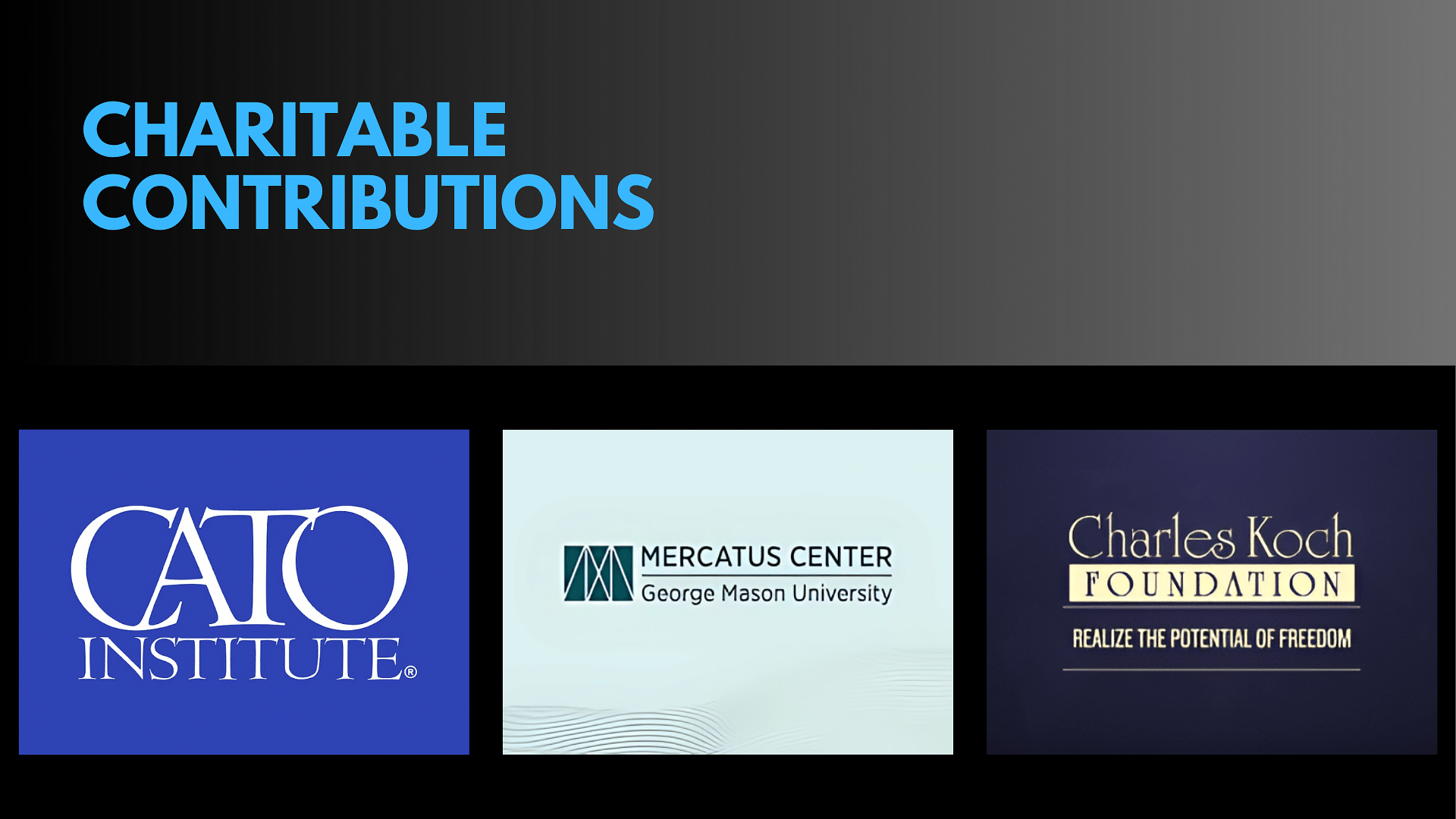
Charles Koch's charitable contributions primarily focus on promoting free-market economics, individual liberties, and educational initiatives.
- He has donated significant sums to organizations like the Cato Institute and the Mercatus Center, which advocate for limited government and free-market policies.
- Koch has also supported criminal justice reform efforts through various initiatives and grants.
- Charles Koch's previously unreported $4.3 billion donation to Believe in People marks the largest publicly disclosed contribution to a 501(c)(4) nonprofit, which faces fewer lobbying and political restrictions than traditional charities.
- From 2018 to 2022, Koch-controlled nonprofits directed $458.7 million to 338 higher education institutions, per the Center for Media and Democracy's analysis of IRS filings. The Koch Foundation, Stand Together Trust, Stand Together Fellowships, and Stand Together Chamber of Commerce facilitated this funding, with the Foundation alone contributing $405.9 million.
- Excluding direct donations and those via donor-advised funds, George Mason University's Schar School received $1.1 million from the Charles Koch Foundation for research on immigration and labor markets.
His philanthropy extends to educational institutions, funding programs, and scholarships that emphasize entrepreneurship and economic freedom. These contributions aim to influence public policy and support causes aligned with his libertarian principles.
What’s Next For Charles Koch?
Looking ahead, Charles Koch continues to focus on advancing his philanthropic endeavors, particularly in promoting free-market principles and criminal justice reform. He aims to expand his influence in shaping public policy through educational initiatives and supporting innovative solutions to societal challenges, maintaining a commitment to his libertarian ideals.
Also Read:
Write a comment
Comments
Darren
Aug 12, 2024The koch brothers single handedly caused more damage to the earth than any others combined! They silenced everyone concerned with climate change and every company had individual scientists working on climate change which stopped because of their greed.
